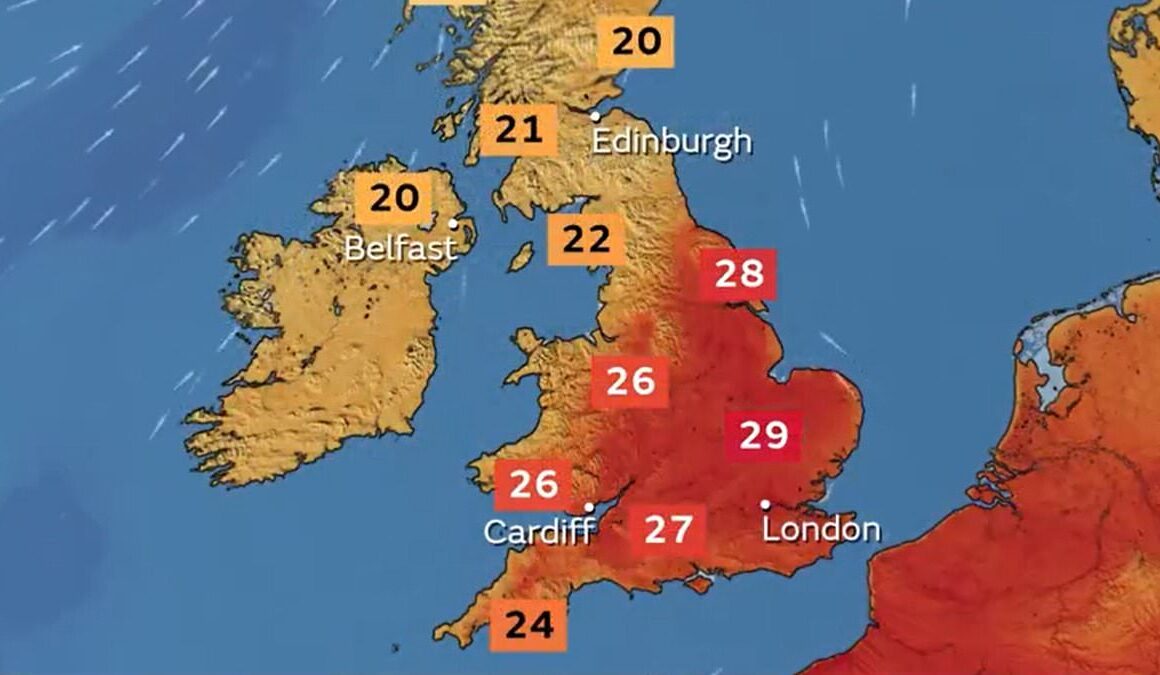Parts of Britain will experience an official heatwave this week as temperatures soar to 32C (90F) with the hottest day of the year so far expected tomorrow.
Heat health alerts have been issued until at least the end of Wednesday with much of the UK set to enjoy ‘very warm, locally hot weather’ over the next few days.
The Met Office said the mercury could hit 32C in London by tomorrow while long-term forecasts remain warm despite the chance of thunderstorms during the week.
The heatwave threshold is met when a location records at least three consecutive days with maximum temperatures exceeding a designated value.
This is 25C (77F) for most of the UK, but rises to 28C (82F) in London and its surrounding area, where temperatures are typically higher.

Commuters cross London Bridge this morning on their way to work as the heatwave begins

Commuters wait for a bus in Central London this morning as they head to work in the sunshine


A warm start in the capital this morning as people cross London Bridge in the sunshine


The warm surge is down to a wave of high pressure and warm air rising from the south, creating dry, fine and sunny conditions and bringing temperatures up.
Met Office forecaster Simon Partridge said: ‘There is certainly potential that it could become an actual official heatwave, because in the spells you’ve had before it hasn’t actually met all the criteria.
‘If there’s not, it’s very close to it, and if you’re out and about and a member of the public then it’s going to feel like a heatwave anyway, because also overnight things are going to turn a little bit more humid and muggy day-on-day as well.’
A UK high of 27.3C (81.1F) was recorded at Charlwood in Surrey yesterday, while the low was 3.5C (38.3F) at Braemar in Aberdeenshire.
Highs of 29C (84F) are expected today and 32C (90F) tomorrow and on Wednesday, both in South East England. Thursday and Friday could both hit 28C (82F).




The UK’s hottest day of the year so far saw a temperature of 31.9C (89.4F) recorded at St James’s Park in London on July 19. The previous record high for 2024 was 30.5C (86.9F) in Wisley, Surrey, on June 26.
Many parts of the country will see temperatures 4C to 5C warmer than average for this time in July, the Met Office said.
Only the far north-west areas of Scotland and parts of Northern Ireland will see some cloud and possibly rain today and tomorrow.
However, this summery spell could end abruptly on Wednesday with some heavy thundery rain expected, although uncertainty remains whether this will be just across the South of England or other parts of the UK.
Despite the sudden showers, temperatures are expected to stay high heading into the first week of August.

Commuters cross London Bridge this morning on their way to work as the heatwave begins

A cyclist makes their way across London Bridge this morning amid the very warm weather

Commuters cross London Bridge this morning on their way to work as the heatwave begins

A beautiful sunrise over the River Thames this morning as London experiences hot weather

Commuters cross London Bridge this morning on their way to work as the heatwave begins
Mr Partridge said: ‘Usually you get these thunderstorms come through and then everything’s a lot cooler and fresher.
‘But although it will be a bit fresher at the end of the week, it will still be about where we should be, if not a degree or so warmer. So a bit of summer is on the cards.’
Meanwhile the UK Health Security Agency has issued a yellow heat health alert for the South and East of England, the Midlands and Yorkshire and Humber regions.
This runs from 9am today until 11pm on Wednesday and warns of the ‘potential for significant impacts to be observed across the health and social care sector due to the high temperatures’.
This includes ‘observed increase in mortality across the population likely, particularly in the 65+ age group or those with health conditions, but impacts may also be seen in younger age groups’.

People out in the early morning sunshine on a warm morning today in Dunsden, Oxfordshire

Beautiful early morning sunshine in Dunsden, Oxfordshire, today as the heatwave begins

The heatwave threshold is met when a location records at least three consecutive days with maximum temperatures exceeding a designated value. This is 25C (77F) for most of the UK, but rises to 28C (82F) in London and its surrounding area, where temperatures are typically higher

The UK Health Security Agency has issued a yellow heat health alert for the South and East of England, the Midlands and Yorkshire and Humber regions – until 11pm on Wednesday
It also says that 'increased demand for remote healthcare services' is likely, and internal temperatures in care settings such as hospitals and care homes 'may exceed recommended threshold for clinical risk assessment'.
Finally, the alert warns of the 'impact on ability of services to be delivered due to heat effects on workforce possible and many indoor environments likely to be overheating, leading to increased risk to vulnerable people living independently in the community as well as in care settings'.
The turnaround in conditions follows a very wet start to July - with East and South East England seeing about a month's worth of rainfall in just the first week.
Also today, the London Fire Brigade urged parents and carers to explain the risks of jumping into water and open water swimming to children.
Craig Carter, the LFB's assistant commissioner for prevention and protection, said: 'It's a sad statistic that the risk of drowning in England increases as children reach their teenage years, and that teenage boys are the most likely group to accidentally drown.
'It can be tempting to cool off from the heat by going for a swim. But despite the heat, waterways are still cold enough to put a person into cold water shock which can affect anybody, no matter their fitness.
'It can cause panic, anxiety, disorientation, and loss of muscular control, which causes a person to gasp for air – inhaling water as a result.'
He urged anyone caught in a dangerous situation to 'float to live', which involves tilting your head back and submerging your ears; trying to relax and breathe normally; gently moving your hands to help you stay afloat if you need to; and spread your arms and legs out to improve stability. Once your breathing is under control, you should then call for help or swim to safety.
Mr Carter added that he was urging people not to take disposable barbecues with them to open spaces because they can cause grass fires, especially in hot weather when the ground is dry.
Separately, a study has found dogs are being made to walk on hot roads, pavements and plastic grass in the heat.
The survey by Burns Pet Nutrition also found half of dog walkers make no change to their walking routine when the weather is hot.
The poll of 2,000 pet owners also revealed 38 per cent believe temperatures of up to 29C is too hot for walkies, while 34 per cent feel 24C heat is too much for a dog.










